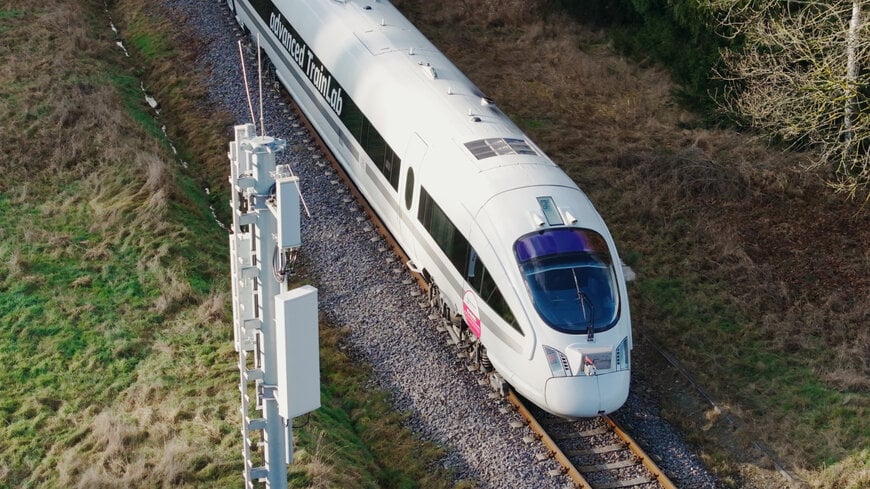railway-international.com
17
'25
Written on Modified on
Nokia deploys world’s first 1900 MHz 5G radio network on Deutsche Bahn test track
Key features of the technology include built-in failover, self-healing capabilities and real-time monitoring to ensure high availability and efficiency.
www.nokia.com

DB Test Track in Erzgebirge, Germany. Photo Credit: Copyright Deutsche Bahn
Nokia and Deutsche Bahn (DB), Germany’s national railway company, have deployed the world’s first commercial 1900 MHz (n101) 5G radio network solution with a 5G Standalone (SA) core, running on live outdoor test tracks. This industry breakthrough positions DB to leverage a modern mobile network on a frequency band dedicated to 5G railway communications in Europe. It also serves as a basis for the Future Railway Mobile Communication System (FRMCS), supporting resilient, efficient and more sustainable rail operations through greater digitalization, capacity and service reliability.
This deployment marks a significant step in the railway industry's transition from the legacy Global System for Mobile Communications for Railway (GSM-R) to the 5G-based FRMCS standard designed for real-time, mission-critical communications between infrastructure and trains. Built to support full railway automation, FRMCS integrates advanced technologies like AI and underpins a more competitive, capable and future-ready industry.
The technology is being implemented at DB’s digital railway test field in the Ore Mountains (Erzgebirge, Germany), running on live trains. Key features include built-in failover, self-healing capabilities and real-time monitoring to ensure high availability and efficiency. The solution will also be used for the European FP2-MORANE-2 project, which evolves from earlier FRMCS initiatives to advance the digitalization of rail across Europe.
The contract extends Deutsche Bahn’s ongoing test trials with Nokia’s 5G SA core and 3700 MHz (n78) radio network, while upgrading to a new solution that includes Nokia’s 1900 MHz (n101) 5G radio network equipment from its AirScale portfolio and optimized 5G SA core. Designed for a smooth migration from GSM-R to FRMCS, it delivers the high reliability and low latency needed for modern rails.
www.nokia.com
Nokia and Deutsche Bahn (DB), Germany’s national railway company, have deployed the world’s first commercial 1900 MHz (n101) 5G radio network solution with a 5G Standalone (SA) core, running on live outdoor test tracks. This industry breakthrough positions DB to leverage a modern mobile network on a frequency band dedicated to 5G railway communications in Europe. It also serves as a basis for the Future Railway Mobile Communication System (FRMCS), supporting resilient, efficient and more sustainable rail operations through greater digitalization, capacity and service reliability.
This deployment marks a significant step in the railway industry's transition from the legacy Global System for Mobile Communications for Railway (GSM-R) to the 5G-based FRMCS standard designed for real-time, mission-critical communications between infrastructure and trains. Built to support full railway automation, FRMCS integrates advanced technologies like AI and underpins a more competitive, capable and future-ready industry.
The technology is being implemented at DB’s digital railway test field in the Ore Mountains (Erzgebirge, Germany), running on live trains. Key features include built-in failover, self-healing capabilities and real-time monitoring to ensure high availability and efficiency. The solution will also be used for the European FP2-MORANE-2 project, which evolves from earlier FRMCS initiatives to advance the digitalization of rail across Europe.
The contract extends Deutsche Bahn’s ongoing test trials with Nokia’s 5G SA core and 3700 MHz (n78) radio network, while upgrading to a new solution that includes Nokia’s 1900 MHz (n101) 5G radio network equipment from its AirScale portfolio and optimized 5G SA core. Designed for a smooth migration from GSM-R to FRMCS, it delivers the high reliability and low latency needed for modern rails.
www.nokia.com

